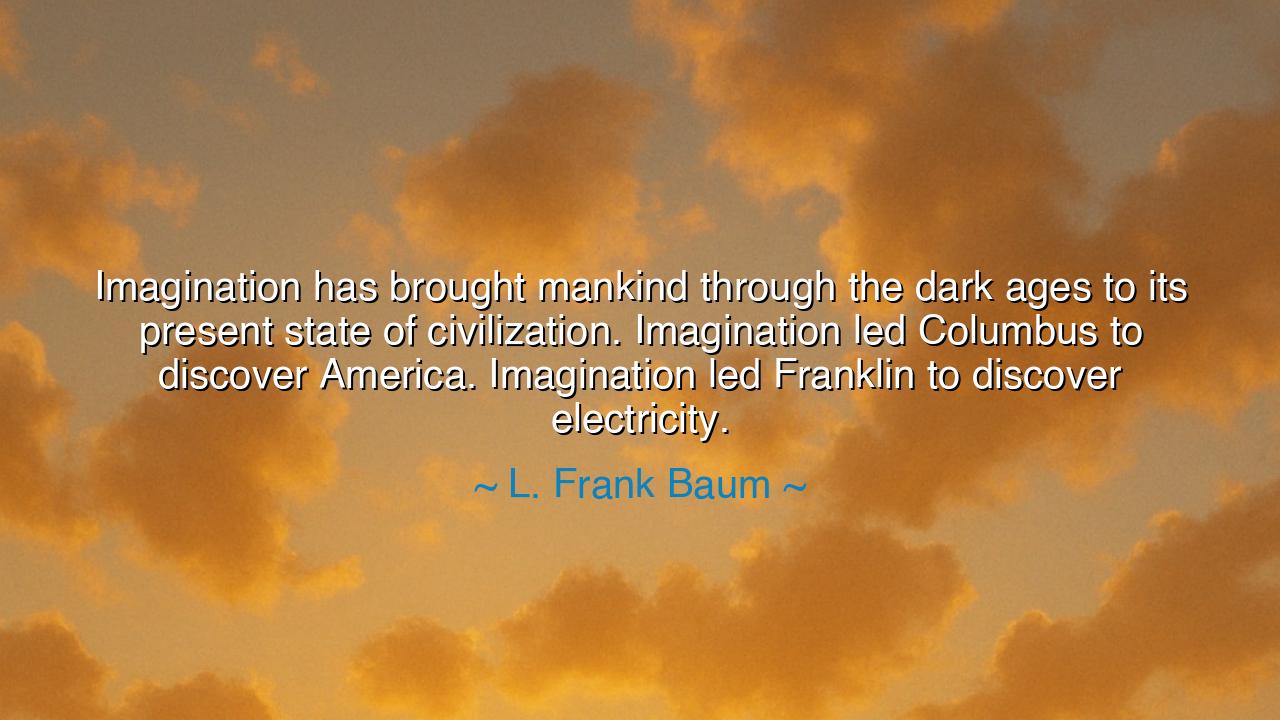
Imagination has brought mankind through the dark ages to its
Imagination has brought mankind through the dark ages to its present state of civilization. Imagination led Columbus to discover America. Imagination led Franklin to discover electricity.






The storyteller L. Frank Baum, whose imagination gave us The Wonderful Wizard of Oz, once declared: “Imagination has brought mankind through the dark ages to its present state of civilization. Imagination led Columbus to discover America. Imagination led Franklin to discover electricity.” In these words lies the voice of a prophet cloaked in the garb of a dreamer. Baum understood that every step forward in human destiny has sprung not from sight, but from vision—from the mysterious wellspring of imagination, which dares to see what is not yet real and to believe what has not yet been proven. To imagine is to light a torch in the darkness, to create pathways where there were only shadows before.
From the dawn of time, when humankind trembled in the caves, it was imagination that first lifted the mind above fear. When the primitive hunter carved symbols upon stone, when the first fireside stories were told beneath the stars, man began to dream of order, beauty, and meaning. The dark ages of ignorance and despair have always been conquered not by brute strength or wealth, but by the power of the unseen thought—the daring vision of what could be. Imagination has been mankind’s lantern through the long night of existence, burning steadily while reason slept and hope faltered.
Consider the tale of Christopher Columbus, invoked by Baum himself. The sailor gazed upon an endless horizon and refused to believe that it marked the end of the world. He saw, in his mind’s eye, a new path to distant lands where none had yet been charted. His ships sailed not upon the seas alone, but upon the waves of imagination. The world called him mad, reckless, doomed—but the dreamer pressed forward, guided not by sight, but by faith in his inner vision. Whether his voyage brought salvation or conquest is for history to judge, yet the lesson remains: every frontier is first crossed in the mind before it is crossed in the flesh.
And think of Benjamin Franklin, whom Baum names beside Columbus. Where others saw lightning as terror from the heavens, Franklin saw a mystery waiting to be unveiled. His imagination turned storm into science; his curiosity transformed fear into knowledge. He tied a key to a kite not out of folly, but out of faith that nature’s secrets could be known. The light that flickered in that storm was not only electricity—it was the light of human courage, of mind reaching beyond the ordinary, daring to question the impossible. From that flash of insight came the energy that now powers the modern world.
Such is the divine paradox: imagination, invisible and intangible, shapes the material destiny of the world. The bridges we cross, the cities we build, the machines that fly—all began as faint sparks in the minds of dreamers. Every civilization is born first as a vision before it becomes stone and steel. To say that imagination has brought mankind through the ages is to say that without it, we would still dwell in darkness, bound by fear and ignorance. The dreamer is the true ancestor of progress; every age of enlightenment is the child of someone’s dream.
Yet Baum’s words carry more than celebration—they carry a summons. For imagination is not merely the gift of poets and inventors; it is the sacred power of every human being. Each of us holds within the capacity to dream of better worlds, kinder hearts, nobler ways of living. When men forget to imagine, they become captives of habit and despair. But when they dare to see anew—to envision justice, to conceive peace, to dream of harmony—then the future begins again. Imagination is not escape; it is creation. It is the divine rebellion against stagnation.
Therefore, my listener, remember this: guard and nurture your imagination, for it is your most precious inheritance. Feed it not only with fantasy, but with truth, with curiosity, with courage. When the world seems fixed and unchangeable, close your eyes and see what could be. Let your dreams be your compass, your ideals your stars. For the path of civilization is not paved by those who accept the world as it is, but by those who dare to imagine it anew.
In the end, Baum’s teaching is both simple and eternal: imagination is the fire of the gods placed within human hearts. It led us from darkness into light, and it will lead us still further, if only we keep it burning. Let us, then, be heirs to that sacred flame—seeing what the eyes cannot see, creating what the world has not yet known, and believing always that the impossible is but another word for the unimagined.






AAdministratorAdministrator
Welcome, honored guests. Please leave a comment, we will respond soon